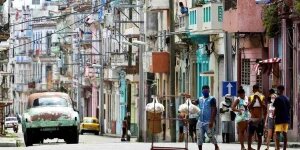
Cubans walking on a street in Havana. Photo: Yander Zamora/EPA/Shutterstock.

Orinoco Tribune – News and opinion pieces about Venezuela and beyond
From Venezuela and made by Venezuelan Chavistas

Cubans walking on a street in Havana. Photo: Yander Zamora/EPA/Shutterstock.
On Thursday, July 28, the Cuban government announced 75 new economic measures aimed at reactivating the national economy. Cuba is currently going through one of the most severe economic crises in its history. The effect of the pandemic, along with greater tightening of the US economic blockade, has caused considerable economic damage to the country. The Gross Domestic Product (GDP) has fallen, as well as the standard of living of more than 11 million Cubans.
The 75 measures revolve around four fundamental axes: strengthening welfare and social policies for the most vulnerable sectors of society, hard currency exchange market for the population and enterprises, foreign investment, and trade.
On the social wefare question, Economy Minister Alejandro Gil Fernández announced that the systems for granting subsidies to individuals and families in need will be improved, as well as the possibility of implementing a system of bonds to benefit the most underprivileged sectors. He added that work will continue in neighborhoods with deficient infrastructure conditions.
Housing construction is another highlighted priority. The shortage of housing has been one of the historical problems of Cuban families. After two years of economic crisis, not only has the construction of new houses slowed down, but the housing fund has suffered a generalized deterioration due to the lack of construction materials in the domestic market. Taking into account this reality, the Cuban government has decided to restore to public enterprises and joint ventures the possibility of building houses for their workers if their profits allow it.
This measure will directly benefit working class families and, in the medium term, could make a difference in solving one of the most pressing problems for Cuba’s economic and social development.
RELATED CONTENT: Cuba: There Is Potential to Attract More Foreign Capital
The economic reforms carried out in 2021 uncovered a series of social problems, such as growing economic inequality. Since then, the Cuban government has been adjusting its social assistance and social security programs to the new context. Thus, recent measures should improve the operability and efficiency of wealth redistribution systems.
Foreign investment is another top priority for Cuba’s development. According to estimates, the island needs over US$2.5 billion annually to achieve economic stability, allowing it to grow and develop. Among the new measures, international and national investors will have the possibility of making consignment sales within Cuban territory. Minister Gil announced that the details of the legal framework for foreign investment in the private sector are almost ready.
This measure is one of the most recurrent demands of Cuban emigres, who until now had limited their participation in the country’s economy to the sending of remittances. Under the new modality, Cuban emigres will have a safe and legal way to make investments in the private sector, in which they have had important participation, although not always in a regulated manner. This should have a positive impact on the development of small and medium industries and, consequently, on the revitalization of the Cuban economy.
Currently the Cuban private sector is not large enough to receive foreign investments, which generally consist of large amounts of money. However, the new regulations will ease the access of the private sector to foreign capital, leading to an increase in its productions destined, for the most part, to satisfy the national demand for goods and services.
In the area of trade, several regulations related to import, especially non-commercial imports, have been modified. Among the measures approved are a 70% reduction in customs duties, a 50% reduction in the cost per imported kilogram, as well as a doubling of the number of kilograms that can be imported free of charge.
RELATED CONTENT: Cuba Facing Hybrid Warfare
These measures, together with the increase in Cuban citizens’ import size and the elimination of limits and taxes on the imports of medicines, food, and personal hygiene items, are aimed at improving the shortage situation the country is currently experiencing due to the sanctions and the fall in domestic production.
The Minister of Economy also reported that a new system for purchasing/selling foreign currency to the population will be announced soon. This is one of the most urgent demands of the Cuban population because of the inflation of the price of foreign currency in the informal market, which is five times higher than the official exchange rate.
The new measure will be aimed at redirecting the foreign currency flow in the national economy towards the State coffers while reducing the share going to speculation in the informal market. Thus, it is intended to reduce inflation, one of the most serious problems of the Cuban economy that has brought so many negative consequences for the population, especially for those who do not receive remittances or do not have enough purchasing power to afford the high prices imposed by speculators.
This new package of measures is possible thanks to the modest recovery of the economy, which shows the concern of the Cuban government for translating the slightest economic improvement into benefits for the population. However, Gil clarified that these are not “magic measures, nor are they risk-free,” which means they can be modified depending on their real results and the evolution of the national economy.
(Resumen Latinoamericano – English) by Gustavo A. Maranges